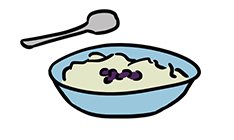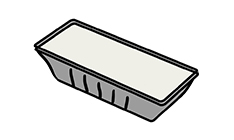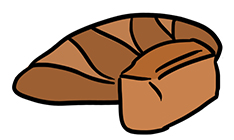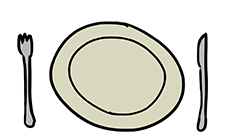The Enjoy Food team recently visited a Diabetes UK Living with Diabetes Day to find out what eating and drinking habits you had that you’re finding hard to break.
We’ve taken your top habits and put Diabetes UK’s dietitian, Natasha Marsland, and clinical psychologist, Dr Jen Nash, who also has Type 1 diabetes, on the case to try to find some solutions.
They’ve suggested eating swaps you can make and psychological techniques you can use to make you more aware and think about what you’re about to do…
Habit 1: Eating in the evening due to boredom
Our dietitian says:
Try to keep busy rather than slumping in front of the TV, but if nothing works and you know you’re a snacker, save some calories for the end of the day. Prepare some vegetable crudités and make dips such as healthier hummus, tzatziki or salsa. Have a low-calorie hot chocolate to curb a sweet craving.

Our psychologist says:
Think creatively about ways to spend the evening, so you are doing things other than just watching TV until bed. Evenings can be unstructured time for many people – so introducing a bit of structure can be oddly relaxing. Having a TV hour, a housework hour, a kids, partner or chat on the phone hour, for example, means there’s less time to be restless and hopefully you won’t find yourself rummaging through the fridge.
Habit 2: Skipping breakfast, not having regular meals and grazing rather than eating proper meals
Our dietitian says:
If you’re not trying to lose weight or if missing meals is not impacting on your diabetes management or health, this might not be a big issue if that’s how you like to eat.
If you find yourself hungry and making unhealthy choices then it is. If time's short in the morning, grab a piece of fruit or take individual porridge portions or cereal pots to work.
Switch unhealthy snacks for packets of nuts, an apple, crackers or reduced-fat cheese with a few cherry tomatoes. Buy a plastic snack box and fill it with healthy snacks. Try tinned food with a ring pull that you can carry with you and make up a lunch on the go eg pineapple or tuna.

Our psychologist says:
Redefine how you think about mealtimes – do you give food the respect it deserves? In days gone by when food was scarce, mealtimes were important ‘formalities’ but our modern-day lives make the whole eating experience less of a priority. Think about how you could experience food fully, even if it’s on the go. Sitting down to eat or not combining eating with other activities, can be ‘formalities’ to help give food and mealtimes the respect they deserve.
Habit 3: Ordering a takeaway because it’s easier than cooking
Our dietitian says:
Try batch cooking so you’ve always got something in the freezer. Cook double the amount, separate portions into microwaveable boxes and freeze.
Have a handful of fail-safe recipes stuck in a book, that you can turn to when you need a quick meal and keep your store cupboard stocked with the ingredients you need to make them.
- Try making this make-ahead-mince.

Our psychologist says:
Often we link a takeaway with a treat and throw all our healthy eating principles out of the window when it arrives at the door, we then end up eating far more than we normally would. If life's busy and takeaways are inevitable, you can still decide to eat a similar-sized portion to a home-cooked meal, instead of the over-sized portion someone else has decided for you.
Habit 4: Eating the kids’ leftovers
Our dietitian says:
Try squirting washing-up liquid over the plate as soon as you've cleared it so you're not tempted to hoover up the leftovers. Don’t think of what the kids have left as wasted food – you’re not a human dustbin! If you eat it when you don’t really need it or want it – it's just a habit that you'll regret afterwards. You could have some veggie crudites or chopped fruit ready in the fridge, so you're not tempted to graze and you have have something healthier to snack on.

Our psychologist says:
Do you ever say to yourself: ‘It’s wrong to waste food?’ Eating leftovers can be as much about not wasting food as it is about how tasty the scraps are. Many of us had this rule drummed into us as kids, but in our modern worlds of plentiful foods, the best thing you can do is to start to answer back when your brain pipes up. Great answers include: ‘Do I really need this?’ or ‘I’m not a bin for leftover food.’ Try them out.
Habit 5: Snacking on cakes and biscuits in the office or work
Our dietitian says:
At work, swap the biscuit barrel for a bowl of fruit. Speak to your colleagues – you never know they might want to join you in eating more healthily and will probably be relieved that the temptation is being removed. Could you all bring different varieties of fruit, so you never get bored? Sometimes the odd treat helps you keep to newly formed healthier eating goals, so instead of banning sugary treats completely save the biscuits for just one day a week. Biscuit Friday, anyone?

Our psychologist says:
Work-time snacks can be a bit of much needed ‘down-time’ or stress relief as they are about the taste. We bond with co-workers and strengthen team relationships through shared eating experiences. Chat to your colleagues – can you replace one of your usual snack times with walk to the park together, a walk-and-chat to the post room or sharing your favourite app? Be creative about other ways to get a break in your day.
Habit 6: Eating too much bread
Our dietitian says:
Try to buy ready-sliced bread and freeze it and only get out what you need. Buy bread rolls so you know the portion sizes, this can help you stay on track – especially important if you are counting your carbs.

Our psychologist says:
Bread has been a staple part of many of our diets for so long that it can feel like you’re missing out when you cut back. Take baby steps towards your goal, cut down by half a slice a week. Replace bread with something else while reducing the amounts, for example oatcakes, crispbreads, crackers or bread sticks are all different types of carbs to experiment with as swaps.
Habit 7: Eating too many sweets
Our dietitian says:
Try to replace sweets with fruit – fresh, frozen, dried or tinned. Chop fruit into plastic lidded containers and pop into the fridge so you’ve got a go-to snack when you’re tempted to have sweets. Small tins of fruit such as pineapple, in juice not syrup, with a ring pull are an easy go-to snack when you fancy something sweet. Sugar-free jelly, low-calorie chocolate drinks, natural yogurt with added chopped fruit are all good too. Why not pop grapes in the freezer to suck on or dried unsweetened dates – they come out chewy, just like toffee.

Our psychologist says:
Try mindful eating. ‘Domino’ foods like sweets can hypnotise us – hand to packet, to mouth, to packet, to mouth… and on it goes.
Play some games with yourself – double (or triple!) the amount of time each sweet is in your mouth, count to 10 (or 20) between each one, figure out if there’s another type of ‘sweetness’ you’re really craving (a hug, a laugh, someone to listen to you…)
Habit 8: Spreading butter on thickly
Our dietitian says:
You may already know that butter contains saturated fat, which is not good for your heart health. A better option would be an unsaturated fat, such as sunflower spread or olive oil spread, but you still have to watch your portion sizes especially if you are trying to lose weight. Save the butter for the occasional treat, for example a meal out. If you don't like spread, a compromise would be a lower-fat butter. Try making sandwiches moist using tomatoes or grated cucumber instead of butter or spread.

Our psychologist says:
Humans are creatures of habit! If you want to break a habit you’ve held for years, you need to remind yourself of the new one so you don’t return to your ‘default’. Put a sticker or post-it note on your spread tub – writing yourself a message or sticking an inspirational photo there is optional.
Habit 9: Feeling pressurised to eat the same as everyone else when you’re out rather than selecting a healthier option
Our dietitian says:
At a restaurant, be the first to pick off the menu, so you’re less likely to be swayed by other people’s choices. Go online before you leave and check out the menu, so you know what the healthier options are before you go.
Choose your meal before you drink any alcohol as this may challenge your will power and don’t arrive at the restaurant hungry or you might order too much food.
Try to have a lower-calorie snack, such a piece of fruit, a few raw veggies or a cup of soup, before you go. If you’re out and about, pop a healthy snack in your bag, so you’re not tempted to grab a chocolate bar when hunger strikes.

Our psychologist says:
It’s hard being the ‘good’ one! Rehearse saying no in the mirror in advance – hearing yourself speak the words helps you prepare. Saying what you are going to eat rather than what you are not can help.Try the 3 C’s – speak with Confidence, Clarity and (Eye) Contact. Being upbeat and smiling tends to silence any possible ‘Go on, you deserve it’ type comments.
